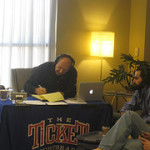
There can be many causes of snoring but an actual physical abnormality is frequently the root cause of snoring and needs to be identified before a remedy be found.
Those annoying noises of loud snoring are usually caused by an obstruction on the free flow of air as it passes through the airway at the back of the throat. The noise is the response to vibration during breathing in, caused by the tongue and upper throat meeting the soft palate and uvula.
A snorer may have poor muscle tone in the tongue and throat area. This type of snoring can be effectively treated with exercises to stop storing.
Frequent Causes of Snoring
Causes can include weight gain leading to a new build-up of fatty cells around the neck area, nasal stuffiness due to sinus congestion, narrowed nostrils, poor sleeping posture or smoking. The muscles may be relaxed as a result of alcohol consumption or sleeping pills.
Another reason for snoring can be an allergy that leads to congestion of the nasal passageway and inflammation of the folds of tissue in the mid to rear nasal passage and tonsils.
A frequent cause of snoring can be a collapsing soft palate, which becomes flaccid during sleep. Surgery is an option to correct this problem although in many cases it has been reported as extremely painful and the effects on the snoring have only been temporary. A frequently better, and certainly cheaper solution for a collapsing soft palate is an anti snoring chinstrap which holds the lower jaw in a slightly forward position thereby preventing the soft palate from falling back and blocking the throat.
To find out more about the anti snoring chinstrap, click here.
Any obstruction to the nasal airways such as a stuffy or blocked nose due to a cold requires the patient to make an added effort to pull air through the nasal passages and this can result in snoring. Blocked sinuses can lead to similar difficulties, as can deformities of the nose or nasal septum. Swollen tissues in the nasal passage that impedes the flow of air through the throat can lead to snoring.
Loud snoring is rarely dangerous unless it is a manifestation of obstructive sleep apnea (OSA), however loud snoring can disturb the sleep of the snorer and their partner which may affect other areas of life due to daytime tiredness. OSA can be potentially fatal and needs to be diagnosed by a doctor or sleep clinic.
Snoring in children can be caused by enlarged tonsils and adenoids. Overweight people with too much neck tissue may be prone to snoring and another cause of snoring can be cysts or tumors, although this is a rare occurrence.
The causes of snoring can be many and varied however exercises to stop snoring can be effective in several cases and are recommended.






